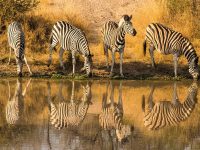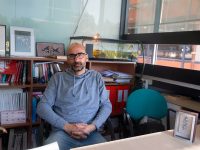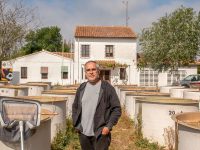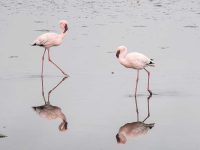Interview with Hanna Kokko
«Evolution does not always lead to better outcomes»
Full professor of Evolutionary Biology at the University of Zurich
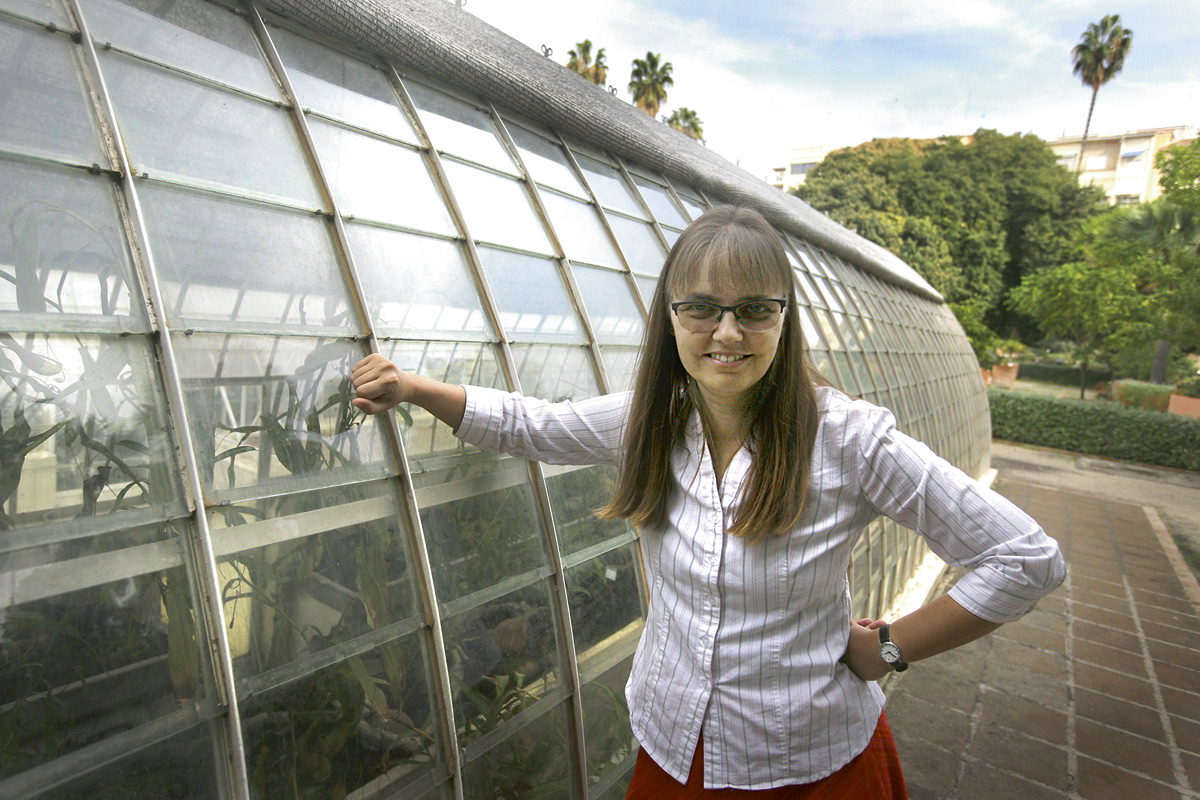
Last 26 October, the Cavanilles Institute of Biodiversity and Evolutionary Biology, celebrated the twentieth anniversary of its foundation with a scientific meeting focused on exploring the intersection between biodiversity and evolution. The meeting, which brought together almost all of its members in the privileged environment of the Botanical Garden of Valencia, was a success. Particularly noteworthy was the opening of that day, by Doctor Hanna Kokko. Dr. Kokko is full professor of Evolutionary Biology at the University of Zurich. She is a leading figure in evolutionary biology, and particularly in applying mathematical modelling to unravel the logic of evolution. She has made significant contributions to many central questions in evolutionary biology, such as in the evolution and maintenance of sex, cooperation, the feedback between ecology and evolution or, lately, the evolutionary ecology of cancer. After a stimulating morning session, we seized the opportunity and talked with her about the origins of her brilliant career, evolution, sex and cancer, among other issues.
You started off in engineering and applied mathematics. What pushed you into biology, and evolutionary biology in particular?
It is an interesting story, I guess. In a way, I have always been fascinated by biology. I have been a birdwatcher since I was a little girl, and then when I was a teenager I read Dawkins’s books and things like that, but at the same time it still did not kick with me that biology can actually be a mathematical subject. I was quite good at maths, and high-school biology textbooks do not connect those topics at all. I had this picture of biology involving Petri dishes and slimy cells, and I did not want to study biology. I actually wanted to become a world-famous physicist and so I studied physics and maths, and I actually liked the maths more than the physics. So I drifted towards maths, and during the undergrad, there was one applied mathematics course and it had examples from economics, from medicine, but also there was a population dynamics growth model from biology, and I was like… aha! It was really that moment when I realized I could actually use the skills that I had doing biology, and I started examining what to study for my master’s thesis. I sent e-mails to all the biology professors who were either in ecology or in physiology and it was very close to Easter and I think the physiologists had probably all gone for their skiing holidays but the ecologists replied… I say as a bit of a joke that is why I studied ecology and evolution, but I think it is like when bacteria keep moving until they are happy.
«Evolution is not about the survival of the species, but pretty ruthlessly about one genotype replacing another»
How do you see the future of mathematical modelling in biology? Will the biology textbooks of tomorrow be ripe with equations?
Probably not, at least if you are talking about school textbooks. I am not even sure they should be full of equations because they will make the subject unappealing to some people, and not everybody has to become a biologist. But I like to go to school-aged children and let them know that biology is actually a mathematical subject because to some people that study biology and come to university it comes to them as a shock that this is required [in the curriculum]. And then there are other people who are interested in working in mathematics but fail to see the opportunities to do so in biology. It is actually a very interesting field for people who like to think logically and mathematics is just one part of it.
When teaching, one often finds that students in ecology classes expect topics such as conservation of wild populations, huge mammals, how to face climate change and so on, and feel deceived and often overwhelmed by the maths. How do you address this?
This is a really big question. This sounds politically incorrect but I am not sure if everybody has the same aptitude for it [for mathematics]. I mean, on the one hand there are people who just like certain things more than others, and on the other hand, if you think about me, I am not good at designing experiments, this is not how my brain works. I do think it is important to make students see that they actually may have an aptitude for it. And when it comes to make them interested about things that are not large mammals, on Monday I will lecture on commensalism and mutualism and I will bring a piece of cheese to class and ask them why I brought it and they will probably think it is because cows are bad for the planet or something. No! All these processes are happening in the microbial populations when a cheese is forming [laughs]. Let us think about things inside!

Ecologist Evelyn Hutchinson famously said that ecology is the theatre for evolutionary plays. What is your view about the current relationship between the fields of ecology and evolution?
The theatre metaphor is actually quite a nice one. The worry I have sometimes these days is that with all this genomics around there are many programs that have little ecology. And I am hoping one day genomic studies have become so easy to conduct that it does not take so much brainpower to figure out how to do it [how to sequence and analyse many genomes at a time] and start thinking again about how selection actually works, and link it with ecology and the lives of organisms in their complicated environments.
Indeed. In relation to this age of big data, it seems many of the genomic studies that relate to ecology are eminently descriptive and explorative. What role do you ascribe to theory in driving such studies towards the important, hypothesis driven questions?
Many people have likened the current state of ecological genomics to the time back then when people did not really know what kind of species even lived in this planet. When people brought a giraffe to central London for people to see. Maybe in the «genomic world» we are still trying to find out what exists. This is a first step, and can highlight important questions, but it is not an answer. I somewhat love every time I see a genomics talk and it contains the words «this offers insight into…» because it almost invariably means they are not even half-way there.
You have worked a lot on the «tragedy of the commons» idea.1 Why is this such a central concept in evolutionary biology?
I think it is important because it highlights the fact that evolution does not always lead to better outcomes. You can almost make a social analogy here whereby if you build a society around competition, do you always get a happier society? Maybe you actually do not, and there are reasons for that. The idea that evolution always leads to higher population viability is demonstrably false. Sexual conflict is a good example of that. Evolution often selects for male traits that make them better competitors in their struggle against other males, but that is terrible for the females, and because the females are the ones who produce the babies, you get fewer babies out. This concept, understanding how it plays out in ecology and evolution, is fascinating.
Ecology frequently unfolds at very large timescales and, in comparison, it seems evolution is often short-sighted. Is that why it is sometimes so difficult for evolution to solve tragedy of the commons scenarios?
It is a reason but it is not the only reason. Maybe we could call it «the» reason if we were to compare it with a hypothetical world where evolution would think in the long term, but that does not exist. My preferred answer is that entities are in conflict with each other even if they are members of the same species. Even within the same organism, we have all this evidence of intra-genomic conflict. So, the fundamental understanding that evolution is not about the survival of the species, but pretty ruthlessly about one genotype replacing another, helps understand why tragedy of the commons situations happen so easily in the evolutionary stage. I think it is also important in outreach to remind people that even though you can take a lot of inspiration from nature, you must never commit the naturalistic fallacy that simply because something is out there [in nature] that means it is good. These things come into play frequently in relation to discussions of gender roles and alike and I always think, well, I could tell you a thing or two about animal sex lives… I am just not sure we must copy everything that is «out there».
«Biology is actually a very interesting field for people who like to think logically»
Is there an analogy here with politics, inasmuch as elections seem to make politics short-sighted with respect to tragedy of the commons problems such as climate change?
Well, it is hard to know what is ideal there because on the other hand dictatorships do not usually lead to good things either so… I have been thinking about these questions lately with respect to how long should the tenure of a department chair last, because if it is really short you cannot achieve anything, but long tenures can lead to unhealthy power structures and passivity. I work in a department where chairs are rotated on a four-year basis and it is quite a nice thing, but I am not claiming to have the answer.
Maybe you could model this!
Well, once I actually tried to model how the best people would start leaving the unhappy departments, which would create a spatial structure of nasty and happy departments… It was quite an interesting exercise but this is an unpublished model so do not force me to show it to you!
Let’s talk a little bit about sex, because you have worked a lot on this area. Can males be viewed as one of the most widespread forms of parasitism in nature?
There is a lot of exploitation in nature. Animals and plants very often exploit other species but nothing prevents them from also exploiting conspecifics, this is just something that happens. And it just so happens that a lot of life is based on this sort of «males and females» dimorphism, and almost by definition males are the exploitative sex in terms of their gamete sizes. If somebody has to provide nutrients for the egg – you can think of the birds here simply because they have the biggest eggs – then a male will tend to have a higher reproductive potential if it aims for more slices of different cakes whereas females just do not have the opportunity to parasitize other’s efforts in such a way, or at least to the same degree (after all egg dumping [where a female lays her eggs in a different nest] does happen). It is not a value judgement, it is just a biological definition. The male strategy has often evolved to parasitize female’s reproductive efforts, leading to all kinds of interesting questions such as sexual conflict or when do males evolve to provide a lot of parental care, which also happens, with striking differences between birds, and fish and mammals. It is a fascinating field.

You have also worked on the «paradox of sex», a fundamental evolutionary problem that is yet to be resolved?2 So, why does sex exist?
Ha! It is interesting how hard the question is. It is hard because sex often comes with males, but not always. We have this pet idea that the initial steps of sex are actually much cheaper than the last, when you get locked into the «male». Maybe once you start having sex you open the door for this parasitic strategy to appear, but if you go down that way it is actually quite hard to get out again. There are some organisms that do this quite beautifully, we study them, but they are quite rare. If you look at realised reversals to asexuality, it often initially works quite badly. They often do not immediately get rid of the two-fold costs of sex, it seems to be a bit tough to reverse a long-term history of sex. But the initial sex bit, in principle seems to be fairly easy. For example, experimental studies in yeast show that if you do not have sex, then you get clonal interference with beneficial mutations arising in different lineages and would not it be wonderful to have them come together? So, these are mechanisms that do work. But personally, I doubt that we will find a mechanism that overcomes reliably the «two-foldness», I think there must be other elements for males to happen.
So, in some species there is evidence that sex is beneficial, partly due to the action of sexual selection, while in others that same sexual selection leads to sexual conflict that ends up being pernicious.
Yes, it is a fun field to work in because you can make predictions either way without being inconsistent. It [whether sex ends up being beneficial or not] just depends on where you put more weight on, sexually aligned interests between the sexes or sexual conflict. Let us say that you are adapting to a new environment and there is something hard to achieve and the males are selected in the same direction as females. Males are usually exposed to stronger sexual selection because only the really good ones fertilise anything whereas most females always reproduce, and this helps evolve faster in the desired direction. At the same time, we know there is a lot of sexually antagonistic stuff as well and the males can evolve to do things that are bad for the females.
«The idea that evolution always leads to higher population viability is demonstrably false. Sexual conflict is a good example of that»
You have a very interesting approximation to sex as a dispersal strategy akin to spatial or time dispersal, but also in identity. Can you dip into this a bit?
Yes, the idea is that asexual reproduction is based on the assumption that whatever I have been doing in the recent past is fantastic, because I feel great and very well adapted to everything, and then why not fill the world with perfect copies of yourself that grow also next to you in the same circumstances. Then you realise that this is going to be unrealistic quite quickly because if you just fill your environment and nobody goes anywhere, locally things are going to turn bad, so then the question is, what you should you do? Nature seems to have come up with at least three solutions. Dispersal on space, where if you do not like to live here, you can go somewhere else; dispersal on time, where you (your genes) can go to bed and sleep for a long time and then wake up and hope there is something different [for example, many organisms do this by creating resting eggs that remain dormant for a certain amount of time], or dispersal in identity, where you have sex and end up (your genes) in a different kind of body, which is another kind of change. If you do one of these things, then you afford a change often quite dramatically, so an interesting thing we are exploring is: why would you do the other things? Because all of these strategies have costs. If you move, there are dangers ahead. If you go dormant, you do not really know what is going to happen when you wake up, and we have already talked about the costs of sex.
What to do, then?
Naively, I would predict that if you have already hedged your bets using one method, you actually should not use the others any more. You cannot pay twice to get the same thing,that is stupid. However, often you get a positive correlation between these things in nature. So, I would really like to work on this more and see when you would expect these covariations, especially because I am really quite fascinated about it. Similarly, I am also fascinated by modular organisms that can break off and flow away. Starfish can break off an arm and a whole individual will grow out of it, it is a type of asexual reproduction. There is a species of starfish where only males have colonized a big part of the Mediterranean. There are no females, so they cannot mate, but because males can reproduce asexually this way, there are only males everywhere.

Maybe they are waiting for an environmental change that drives them extinct!
Or maybe a female arrives some day! It would be lovely to look at the genomics of this because they do it without sex.
Lately, you have been doing very interesting work on the evolutionary ecology of cancer. Here is a question: why do not elephants have more cancer than mice?
I guess first I have to explain why the question exists. The idea is that every time your cells divide there is a probability that something will go wrong and if you are a bigger organism you also have more cells – in principle you could also have bigger cells but in practice we just have more cells –, so you should have more cancer. A recent paper shows that, in humans, 10 cm more height translates roughly into ten percent more cancer risk. So, all else being equal being bigger is more dangerous cancer-wise. But cancer is also interesting because if you have a higher risk of getting cancer it does not mean you get cancer from day one, it takes a while to get all the mutations necessary to develop cancer so it is a probabilistic risk that increases with age. This of course does not help big animals, because they are usually the long-lived animals so they need to build a large body but they also need to maintain it for a long time. What elephants have done, and this is quite new work, is they have many copies of a gene called p53, which is basically one of the many genes and mechanisms that make sure that things go ok. If there is damage, it basically tells the cell «you are a bad cell, go and die», and then the cells obey and you are fine. If you get mutations in this gene, things go astray; there are humans that have mutations in this gene and end up having many different cancers. So, it is not ideal to have only one copy of this gene, which is what happens in humans, while elephants have twenty copies of the p53 gene. We do not know what happened there evolutionarily speaking but to me it sounds like you cannot even begin to evolve to be so big unless you are an organism who has evolved to be much better with the cancer defences. I have been modelling evolution of this type of defence processes.
So, what comes first, evolving to get bigger and then selection towards better cancer defences or the other way around?
Oh, I wish I knew. Probably a bit of both. I have modelled the first more than the latter. You can ask questions like: if you have these many cells and this degree of extrinsic mortality [probability of being eaten or dying due to extrinsic causes] which will allow you to live this many years on average, then what is the selective advantage of being larger given the probabilistic rate of cancer?
«I think scientists should try their best to do something else than just staying in their ivory tower»
So, evolution does have something to teach medicine…
Sure, I know people who have made half their career based on making this point very strongly. Obviously, a much more urgent need is to understand the evolution of antibiotic resistance. Our cancer traits are more or less what they are and it can be therapeutically important to know what is going on but when it comes to a really rapid evolution that is happening every day on this planet and it is actually pretty scary, it is antibiotic resistance.
Last question. As scientists, we are often asked to communicate our research to the general public, like some sort of duty. Do you agree with this idea?
Different people have different talents. Whether everybody should communicate science in a more or less obligatory way… I would say that if your skills are very good to make politicians see the world from a better conservation point of view, you should do it, which is not quite the same as meeting school kids. But I think scientists should try their best to do something else than just staying in their ivory tower.
1 This concept was coined by the British economist William Forster Lloyd, and later popularised by the American ecologist and philosopher Garret Hardin. It describes a situation in a shared-resource system, such as different farmers grazing on the same common land, where the selfish actions of individual farmers – in this case farmers adding more cows to their herd– lead to overexploitation of the common resource and an endpoint were the common good is not maximized. In evolution, it reflects situations were selection favours adaptations that are good for an individual’s genes in the short-term but bad for the group/species – and hence ultimately potentially for those same selfish genes – in the long-term. (Go back)
2The «paradox of sex» is a fundamental and yet unresolved evolutionary problem. It lies in explaining the maintenance of sexual reproduction given its multiple costs. For example, the «two-fold cost of sex» refers to the fact that an asexually reproducing organism will reproduce at twice the rate of a sexually reproducing organism with male and female sexes because only the latter reproduce.(Go back)

